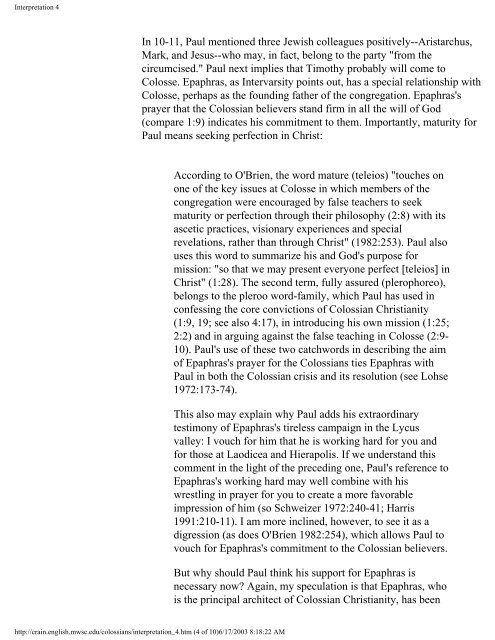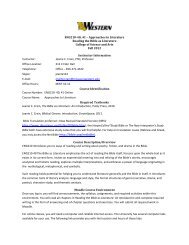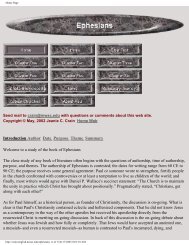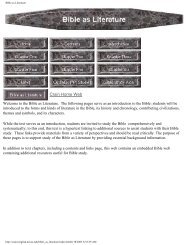Introduction to Colossians: Authorship, Date, Audience - Crain Home
Introduction to Colossians: Authorship, Date, Audience - Crain Home
Introduction to Colossians: Authorship, Date, Audience - Crain Home
You also want an ePaper? Increase the reach of your titles
YUMPU automatically turns print PDFs into web optimized ePapers that Google loves.
Interpretation 4<br />
In 10-11, Paul mentioned three Jewish colleagues positively--Aristarchus,<br />
Mark, and Jesus--who may, in fact, belong <strong>to</strong> the party "from the<br />
circumcised." Paul next implies that Timothy probably will come <strong>to</strong><br />
Colosse. Epaphras, as Intervarsity points out, has a special relationship with<br />
Colosse, perhaps as the founding father of the congregation. Epaphras's<br />
prayer that the Colossian believers stand firm in all the will of God<br />
(compare 1:9) indicates his commitment <strong>to</strong> them. Importantly, maturity for<br />
Paul means seeking perfection in Christ:<br />
http://crain.english.mwsc.edu/colossians/interpretation_4.htm (4 of 10)6/17/2003 8:18:22 AM<br />
According <strong>to</strong> O'Brien, the word mature (teleios) "<strong>to</strong>uches on<br />
one of the key issues at Colosse in which members of the<br />
congregation were encouraged by false teachers <strong>to</strong> seek<br />
maturity or perfection through their philosophy (2:8) with its<br />
ascetic practices, visionary experiences and special<br />
revelations, rather than through Christ" (1982:253). Paul also<br />
uses this word <strong>to</strong> summarize his and God's purpose for<br />
mission: "so that we may present everyone perfect [teleios] in<br />
Christ" (1:28). The second term, fully assured (plerophoreo),<br />
belongs <strong>to</strong> the pleroo word-family, which Paul has used in<br />
confessing the core convictions of Colossian Christianity<br />
(1:9, 19; see also 4:17), in introducing his own mission (1:25;<br />
2:2) and in arguing against the false teaching in Colosse (2:9-<br />
10). Paul's use of these two catchwords in describing the aim<br />
of Epaphras's prayer for the <strong>Colossians</strong> ties Epaphras with<br />
Paul in both the Colossian crisis and its resolution (see Lohse<br />
1972:173-74).<br />
This also may explain why Paul adds his extraordinary<br />
testimony of Epaphras's tireless campaign in the Lycus<br />
valley: I vouch for him that he is working hard for you and<br />
for those at Laodicea and Hierapolis. If we understand this<br />
comment in the light of the preceding one, Paul's reference <strong>to</strong><br />
Epaphras's working hard may well combine with his<br />
wrestling in prayer for you <strong>to</strong> create a more favorable<br />
impression of him (so Schweizer 1972:240-41; Harris<br />
1991:210-11). I am more inclined, however, <strong>to</strong> see it as a<br />
digression (as does O'Brien 1982:254), which allows Paul <strong>to</strong><br />
vouch for Epaphras's commitment <strong>to</strong> the Colossian believers.<br />
But why should Paul think his support for Epaphras is<br />
necessary now? Again, my speculation is that Epaphras, who<br />
is the principal architect of Colossian Christianity, has been






![[38cb1273][0][sourcelist][1][0] - Crain Home](https://img.yumpu.com/2168350/1/190x245/38cb12730sourcelist10-crain-home.jpg?quality=85)